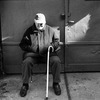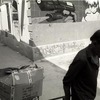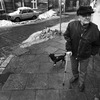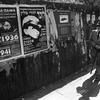Kroke, Klezmer and Kazimierz
Cracow's Klezmer revival has been likened to a flower growing from the ashes and this is an apt comparison. This exotic, haunting music had been a staple of Jewish weddings and festivals since medieval times - it plumbed the soul of the Eastern European shtetl and launched it into glorious, dizzying flight.
Klezmer took root in the towns and villages of Eastern Europe, drawing on Slavic folk traditions as well as more diverse influences from Turkey and the Middle East. By the twentieth century it had evolved into an instantly recognizable style that transcended ethnic boundaries.
Cracow itself had been a hub of Jewish civilization in Europe for several centuries, a situation that had been aided by the tolerant mindset of Poland's Renaissance elite. The relationship between Poles and Jews was not, however, always harmonious, but the greatest storm was brought by outside invaders in 1939.
The historic district of Kazimierz had been the heart of Jewish Cracow until the war. However, few Jewish families survived the conflict. The trickle of families that returned in 1945 was too small to be called a community.
For several decades, crumbling graveyards, synagogues and houses were the only palpable remains of six centuries of Jewish history in Cracow - Kazimierz was a realm of ghosts.
When democratic changes came to Poland in 1989, much of Cracow was falling apart. Kazimierz, the heart of the old Jewish city, was in especially bad shape, and it was a very morose place to explore.
In the early 1990's, a number of Polish artists started to become enchanted by the cultural heritage of this lost world. One of the first to lead the revival of Klezmer was Irena Urbanska, a gifted singer and teacher at Cracow's Music Academy. She had previously toured with the celebrated composer Penderecki as a soloist with the pre-eminent Cracow choir. Urbanska resurrected an array of traditional Jewish melodies, and she continues to perform them today with the group Ira and Klezmer.
One of the leading lights in today's revival are Kroke, who emerged under the aegis of Urbanska. The three members had studied at the Music Academy, and they released their first, eponymously titled album in 1995. Kroke is indeed the ancient Jewish name for Cracow, and much of the group's inspiration has come from treading the faded streets of Kazimierz.
Kroke's approach to the music is experimental, and the group have carved an uplifting, eclectic style that is very much their own. Recent albums, including a marvelous collaboration with the English violinist, Nigel Kennedy, have brought them international success.
Another fine group to have emerged in recent years is the Cracow Klezmer Band. This group has also gained success outside of Poland, and like Kroke, they take an experimental approach to the klezmer tradition. However, theirs is a darker, more fiery beauty than Kroke's - a powerful concoction that shimmers with a coruscating energy.
The old district of Kazimierz has itself undergone something of a renaissance in recent years. Today it is amongst the most colourful parts of Cracow, with a distinctly artistic atmosphere. Klezmer concerts are a regular feature of the nightlife, and numerous cellars have opened up, providing venues for music of all kinds.
The annual Jewish Cultural Festival, which was founded in 1991, is now an international event. On the closing night of the festival, the ancient market square of Szeroka erupts into a marvelous street party, with the strains of Klezmer echoing across the city.

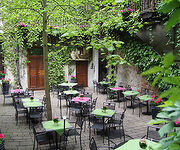 Kawaleria Szarza Smaku
Kawaleria Szarza Smaku
 Europejska
Europejska
 Krakow Pinball Museum
Krakow Pinball Museum



